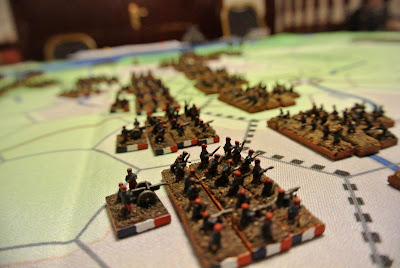The Swiss, aaah, what are they when the do not move? Sitting ducks, Targets and Schiessbudenfiguren! We set them on their journey, the Reisigen! Run home, Reisläufer! Gloria Victoria, all for the French juchheirassa! Toblerone now with wider gaps!
The French Cavalry was played by Ken, who joined recently our Renaissance league, and aspiring defender of the Papal throne(s) for battles to come. For the French centre a very capable club mate stepped in, who's name I unforgivenly forgot, even as Jack shouted me his name 3 times!!! And myself as the German part with some Landsknechts. On the other side the usual victims of biblical sins and proportions, Angus, Jack and Donald defending Milan for the Swiss in their own ways and good intentions.
As the Ken was appointed CinC he gave the order of the day - no retreat, attack as fast as possible, en avant, lets out step the swift Swiss! So we advanced as quick as a cannonball on both flanks and we somehow did it, out shot and unsettled them before they could find their footing. Donald fought well, but too much tabletop embellishment hindered his advance ... all the while the bullets and shots were relentlessly flying ... at the end one Swiss block was shaken in front of two medium imperial feldschlangen ...hmm ... , Ken had destroyed most of the Italian tin pride ... I for the record successfully formed a hedgehog blocking a another Swiss block while shooting at the other, ended Swiss hegemony in its begining.
All in all we had fun I guess, even if the retro-garde can't come out of their strategic lethargy .. maybe one day ...
I set up the 2nd Novara battle with a little bit of extras, the pike blocks were bigger for our standards, and the supports were a bit more numerous. We used Pike and Shotte with a bit of home grown spice.
The Figures were by me, Angus, Jack and of course Donald.
Angus:
SESWC:
For the ones who want to know what really happened:
The French had been victorious at Ravenna the previous year. Nevertheless, the French under King Louis XII were driven out of the city of Milan the following month by the Holy League.
In 1513, the French army of 10,000 under Louis de la Trémoille was besieging the city of Novara, which was held by some of the Duke of Milan‘s Swiss mercenaries. It has been argued that the Swiss may have intended to annex Milan to the Swiss. Novara, c. 40 kilometers west of Milan, was the second most important city of the Milanese duchy.
However, the French were surprised at their camp there on June 6 by a Swiss relief army of some 13,000 troops, who came to relieve their forces in the town. The German Landsknecht mercenaries of the French, pike-armed like the Swiss, were able to form up into heavy squares, and the French were able to deploy some of their artillery. Despite this, the Swiss onslaught, sweeping in from multiple directions due to forced marches which achieved encirclement of the French camp, took the French guns, pushed back the Landsknecht infantry regiments, and destroyed the Landsknecht squares. Caught off guard, the French heavy cavalry, their decisive arm, was unable to properly deploy, and played little role in the fight.
The battle was particularly bloody, with 5,000 casualties (other sources state up to 10,000) on the French side, and moderate losses for the Swiss pikemen, mostly suffered from the French artillery as the Swiss moved into the attack. 700 men were killed in three minutes by heavy artillery fire. Additionally, after the battle, the Swiss executed the hundreds of German mercenaries they had captured who had fought for the French. Having routed the French army, the Swiss were unable to launch a close pursuit because of their lack of cavalry, but several contingents of Swiss did follow the French withdrawal all the way to Dijon before the French paid them off to leave France. The Swiss captured 22 French guns with their carriages.
The French defeat forced Louis XII to withdraw from Milan and Italy in general, and led to the temporary restoration of Duke Maximilian Sforza, although he was widely regarded to be the puppet of his Swiss mercenaries and „allies“, who held real military power in Milan.






















































